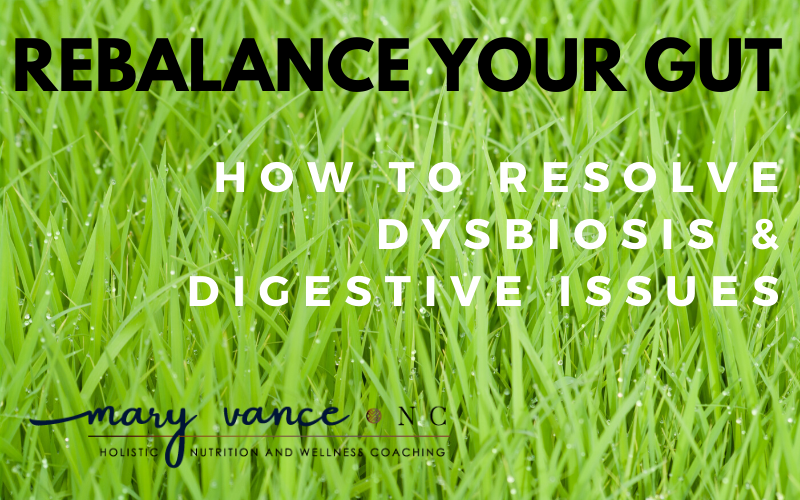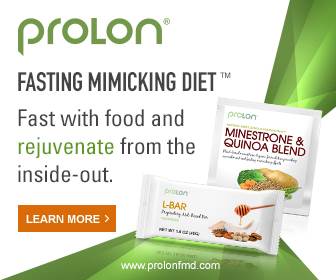If you struggle with frequent bloating, gas, belching, heartburn, constipation, and/or diarrhea (you’re entitled to more than one symptom), you probably have some degree of gut dysbiosis. Dysbiosis means you have too much “bad” bacteria in relation to beneficial bacteria in your large intestine (AKA colon). Let’s take a look at the different types of gut dysbiosis and how to resolve each to rebalance the gut for optimal digestion and health.
First off, a few cool facts about your digestive tract and alllll the microbes that live inside it/you:
- you have anywhere from 500-1,000 species of bacteria living in your gut. This comes to trillions (estimates say 3 trillion – 10s of trillions; we really don’t know the exact number) of individual bacteria.
- Your micobiota is the collection of all the microbes–bacteria, viruses, fungi, archaea–that make up your microbiome.
- The microbiome is the collection of your microbes’ genetic material. The number of genes in all the microbes in one person’s microbiome is 150 times the number of genes in the human genome. (source) That means that yes, you are more bacteria than human, and your bacteria have a genome. The microbiome is known as ‘the second genome.’
- Everyone has a unique microbiome. Kind of like a fingerprint. There are no universally shared microbial species across the whole human population. Our microbial communities are in fact highly personalized and specialized to our bodies. (source)
- Most of our gut microbes belong to just a few major taxonomic groups or phyla (sometimes called “keystone species”). So there is some consistency across individuals. Lactobacillus, bifido species, and akkermansia are a few examples.
- Diet has a significant impact on our microbiome.
- You skin also has its own microbiome.
- We’re still only scratching the surface of what there is to know about the microbiome.
What is Dysbiosis?
We should ideally have about 85 percent beneficial bacteria in our gut to about 15 percent “bad” microbes like viruses or pathogens. It is absolutely normal to have viruses (like e. coli, for example) and strains of pathogenic bacteria in our gut. It’s also normal to have candida species in the gut. These “bad guys” actually challenge our good bacteria and make our immune system and microbiome stronger overall. But when the bad guys overtake the good guys, dysbiosis occurs and unpleasant digestive symptoms usually result.
Most of our gut bacteria are symbiotic, meaning they perform vital functions for us like digesting food that we can’t, manufacturing vitamins, and boosting immune health. Examples of symbiotic bacteria are lactobacillus and bifido species. Some of our gut microbes are opportunistic (like yeast/candida), meaning when the opportunity arises– the host has a weakened immune system, for example–they will take over the good guys and advance their own agenda. This is a form of dysbiosis. Other types of bad bacteria, like C difficile, can cause disease and may be passed to humans through contaminated food or water.
What Causes Dysbiosis?
- Poor diet: not enough fiber from plant foods, processed foods, too much sugar, alcohol, artificial sweeteners. Your probiotic bacteria need prebiotic fibers from plant foods to thrive!
- Certain meds like metformin, antacids, hormonal birth control, and even regular use of NSAIDs like advil
- Antibiotics are indiscriminate killers that kill both good and bad bacteria, reduce bacterial diversity, and create more space for potential pathogens and opportunists.
- Stress, which weakens the immune system and allows opportunistic bacteria to take over, or inability to fight off bad bacteria like C. difficile
- Pesticides
- Food poisoning, a main cause of SIBO
How do I know if I have dysbiosis?
- bloating, indigestion, foul smelling gas, heartburn, frequent belching
- alternating constipation and diarrhea, sudden changes in gut motility
- bad breath
- brain fog
- depression & anxiety
- IBS
- rectal itching
- recurrent yeast infections
- skin issues
- you can do stool testing or microbiome assessment. I use the GI MAP which you can order here.
Four Types of Gut Dysbiosis
There are several different types of dysbiosis, and each one is treated a bit differently. So, for optimal results, it’s ideal to do a stool test AND some kind of microbiome assessment (like thyrve or biohm, for example) to assess gut health so you know the best treatment. This way you’re not firing without aiming!
Let’s take a look at the four main causes of gut dysbiosis.
1)Infection with a frank pathogen: this means some microbe that shouldn’t be allowed in hitchhiked its way into your gut and decided to stick around, like a parasite. Common with a food poisoning incident. Now, the cool thing is that if your digestive system is working properly and you are producing adequate amounts of stomach acid, you’re able to kill off potential pathogens by the time they get to your stomach, and these pathogens don’t become a problem. BUT if your immune system is weak or your digestive system isn’t in tip top shape so you’re not producing stomach juices acidic enough to kill the bad guys, you have a greater risk of contracting pathogens or parasites. Examples are virulent strains of h pylori, C. diff, parasites like blastocystis or giardia. Symptoms often include diarrhea, vomiting, stomach pain, heartburn, ulcers. BUT you may have no obvious symptoms, or you may develop nutrient deficiencies, for example.
2)Too many opportunistic or potential pathogens: this type of dysbiosis means part of your normal microbiota has gone rogue and staged a revolution to take over your good guys. This means the opportunistic microbes (like yeast, for example) have taken the opportunity to overtake your good guys. One of the most common causes of this type of dysbiosis is antibiotic and medication use. Poor diet, too much white flour, sugar, and alcohol, are other common causes. Any chronic digestive symptom can be a sign of this type of dysbiosis. You’ll need to take anti-microbial herbs to knock down the opportunists, then make sure to heal leaky gut and repopulate your gut with more good guys.
3)Too few good guys: this means you’re off your ideal 85%:15% ratio of good : bad microbes. You have too many bad bacteria and too few good. This is becoming more common due to our highly processed diets, overuse of meds and antibiotics, eating conventional animal protein that contains hormones and antibiotics, and our overly sanitary antibacterial lifestyles. The more diverse your microbiome and the more strains of beneficial bacteria you harbor, the stronger your digestion and healthier you will be. But our diversity is plummeting, making us less healthy and prone to recurrent digestive issues. Read more about how to rebuild your gut flora here.
4)Translocation of microbes where they don’t belong: This is basically SIBO, AKA small intestine bacteria overgrowth. In this case, bacteria takes root in the small intestine where it doesn’t belong. It’s not necessarily “bad” bacteria; it’s just in the wrong place. The small intestine should be relatively free of microbes. They belong in your colon to ferment fibrous foods you eat, helping with digestion. When they’re trapped in the small intestine, they ferment the carbs you eat (their preferred fuel source) too early, causing chronic bloating, gas, and nutrient deficiencies. You need to do a specific gut healing diet and herbal (or antibiotic) protocol to overcome SIBO. Read more here.
How to Resolve Dysbiosis
Each one of the four types of is treated differently. To get rid of frank pathogens/parasites, SIBO, and opportunistic of pathogenic bacteria, I take a 4 step/4R approach:
- remove the offending parasite/pathogen/bacteria
- replace digestive enzymes and poor stomach acid
- repair the gut lining
- reinoculate the gut. You can read about that here.
I highly recommend stool testing to see exactly which type of dysbiosis you have, because we use different herbs for each type. Get the GI MAP here.
Most important is to heal the gut and increase bacterial diversity. Do this by gradually increasing fiber (aim for 40 grams per day); drink less– or better yet no– alcohol; take a probiotic and eat fermented foods; work on the steps for healing leaky gut.
Burping and farting your way through the day, or looking six months pregnant with bloat at the end of the day isn’t normal. Rebalancing bacteria levels in the gut and boosting microbial diversity means a flatter belly, better digestion, and happier you!
Want more help resolving gut issues? Check out the 21 day gut reset.
Pin it!

Mary Vance is a Certified Nutrition Consultant and author specializing in digestive health. She combines a science-based approach with natural therapies to rebalance the body. In addition to her 1:1 coaching, she offers courses to help you heal your gut and improve your health. Mary lives in San Francisco and Lake Tahoe in Northern California. Read more about her coaching practice here and her background here.








Thank you for a very informative and helpful articles along with guide to products. I have celiac intolerance ,IBs-d primarily. Have recurring diarrhea primarily my problem . Take probiotics, digestive enzymes,supplements candibactin ar &br, magnesium,but it seems no matter what I do I end up with a round of diarrhea that last for 2 plus days 3 or 5 x per month- gf diet, low sugar, this past week I had made a desert and had alcohol drinks maybe 4 in two days. Then away goes the tum tum- any suggestions – I am not sure what to do- thanks for any guidance
Hi Julia, the first item would be stool testing to rule out parasites, pathogens in the gut, and treat accordingly. Otherwise it could be food intolerance, so an elimination diet would be a good idea also. You can contact me for more info on how to order, etc.